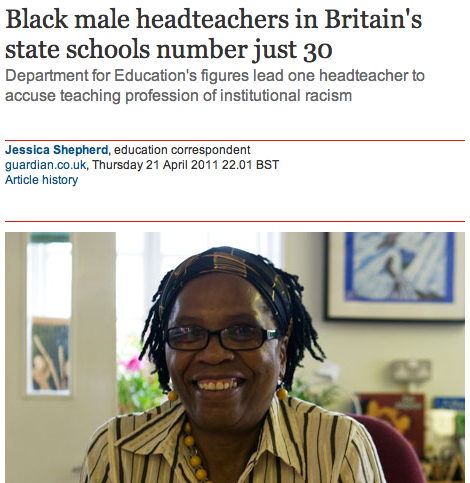 “Black male headteachers in Britain’s state schools number just 30” is the startling headline on The Guardian’s website, and on the side of the front page of today’s printed paper. There are 127 female heads too, meaning that – in total – 0.7% of headteachers in the UK are black, while 2% of the population is black. The first paragraph of the story claims this is due to “institutional racism”, actually taking words from an Essex headteacher later in the story.
“Black male headteachers in Britain’s state schools number just 30” is the startling headline on The Guardian’s website, and on the side of the front page of today’s printed paper. There are 127 female heads too, meaning that – in total – 0.7% of headteachers in the UK are black, while 2% of the population is black. The first paragraph of the story claims this is due to “institutional racism”, actually taking words from an Essex headteacher later in the story.
Hold on a moment. I don’t deny that these numbers are not good, and need to increase, but is the cause so drastic?
Think for a moment about the path to becoming a head teacher. For a start you almost certainly need a university degree. Then you need to work for a long period of time as a teacher, rising up through the ranks. You’re going to have needed to have entered university at least 15 years ago, probably more than that, at a time when fewer people studied, and access to university education was even more restricted to the middle classes than it is now. Historic economic disadvantage for black people in the UK would mean a lower percentage studied, a lower percentage graduated, became teachers etc.
In short it looks to me like this is another example of the newspapers taking the numbers and telling a story only on that basis, without additional context, in the same way as was done over Oxbridge entrance and taken apart by Mark Pack here.
Don’t get me wrong – this is a problem, it needs to be addressed, and there might be some institutional racism. But there are probably many more longer term, more mundane, less headline-grabbing factors too.








The real question for me about the headteacher figure is how it is changing over time because, as you say, it partly reflects how things were at the entrance level a couple of decades ago (cf figures for high court judges). given also that the black population was smaller then, it’s not obvious that 0.7% tells us much more than that in many respects the 1970s and 1980s were not great times for equality in the UK.